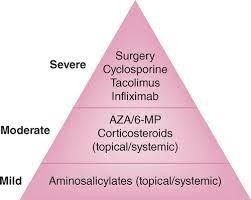A nurse is caring for a newly admitted client who has acute inflammatory bowel disease with constipation and reports bloody stools. Which of the following medications should the nurse plan to administer?
Omeprazole
Infliximab
Ondansetron
Metoclopramide
The Correct Answer is B
Choice A rationale
Omeprazole is a proton pump inhibitor used to reduce stomach acid production and is not typically used for treating bloody stools in inflammatory bowel disease.
Choice B rationale:
Infliximab is used to treat inflammatory bowel disease and can help manage symptoms such as bloody stools by suppressing the inflammatory response.
Choice C rationale:
Ondansetron is an antiemetic used for nausea and vomiting, not related to bloody stools.
Choice D rationale:
Metoclopramide is used to treat nausea, vomiting, and gastrointestinal motility disorders, not specifically indicated for bloody stools.

Nursing Test Bank
Naxlex Comprehensive Predictor Exams
Related Questions
Correct Answer is D
Explanation
Choice A rationale:
Replacing the ritual with a different ritualistic behavior is possible, but it does not necessarily predict the initial response when the restriction is first imposed.
Choice B rationale:
Reporting auditory hallucinations is not a typical response to restricting ritualistic behavior in someone with OCD.
Choice C rationale:
Expressing relief from not having to perform the ritual is unlikely, as ritualistic behaviors in OCD are often driven by distress and anxiety.
Choice D rationale:
If ritualistic behavior is restricted in an individual with obsessive- compulsive disorder (OCD), they may experience panic-level anxiety due to their inability to engage in their usual coping mechanism. OCD rituals are often performed to reduce anxiety, and restricting them can lead to increased distress.
Correct Answer is B
Explanation
Choice A rationale:
Terbutaline is a medication used to inhibit uterine contractions and is not directly related to managing coarctation of the aorta.
Choice B rationale:
Coarctation of the aorta is a congenital heart defect characterized by narrowing of the aorta, which can lead to increased pressure and decreased blood flow to the lower part of the body. During labor, epidural anesthesia is often recommended for clients with coarctation of the aorta to reduce stress and pain, as well as to maintain stable blood pressure.
Choice C rationale:
Placing a client with coarctation of the aorta in a supine position during labor can worsen the obstruction of blood flow and is contraindicated. Left lateral positioning or other positions that enhance venous return are preferred.
Choice D rationale:
There is no established increased risk of preeclampsia in clients with coarctation of the aorta.
Whether you are a student looking to ace your exams or a practicing nurse seeking to enhance your expertise , our nursing education contents will empower you with the confidence and competence to make a difference in the lives of patients and become a respected leader in the healthcare field.
Visit Naxlex, invest in your future and unlock endless possibilities with our unparalleled nursing education contents today
Report Wrong Answer on the Current Question
Do you disagree with the answer? If yes, what is your expected answer? Explain.
Kindly be descriptive with the issue you are facing.
